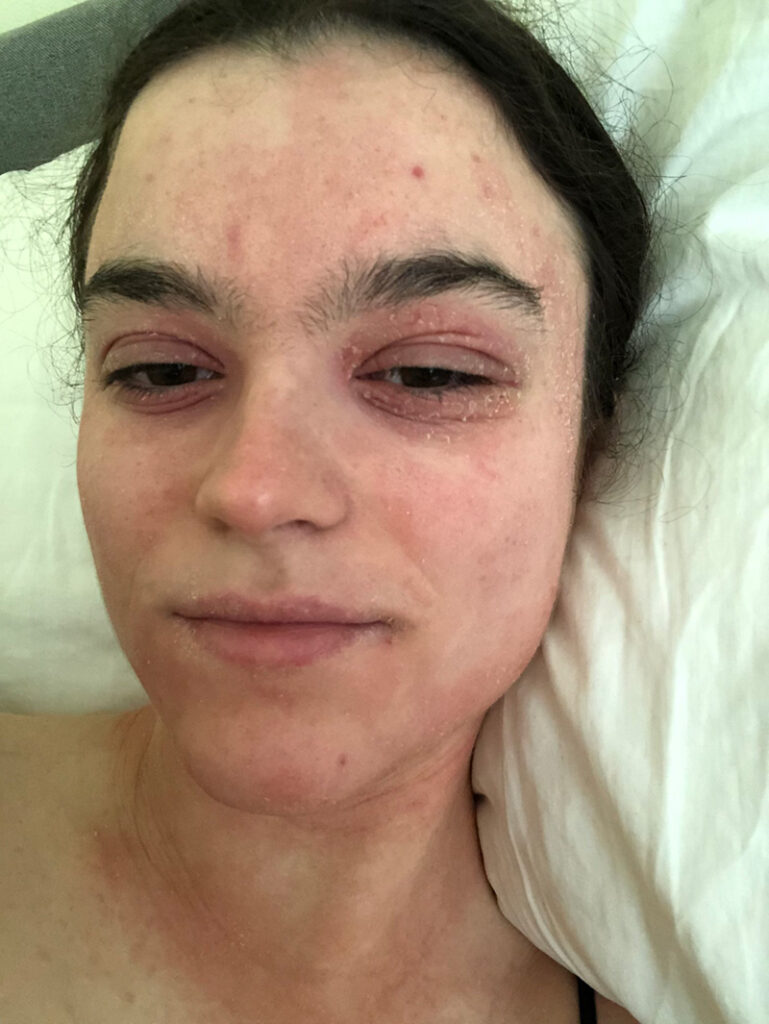College student Karin Stoddart experienced eczema as a child. But she wasn’t officially diagnosed when she was young, and for that matter, she never thought much about it because her symptoms had been relatively minor. However, that changed at age 19 when a sudden, severe flare changed her life overnight. She soon learned she had atopic dermatitis.
The diagnosis kicked off a nearly yearlong ordeal of trying different remedies and negotiating with two insurance companies before she was ultimately approved for the biologic that finally eased her symptoms. Now, Stoddart is sharing an important message with other eczema patients who may feel confused about what to do when step therapy regulations interfere with their doctor’s recommended treatment plan.
Stressful changes
Anxiety can trigger eczema flares, and for Stoddart, 2021 and 2022 involved stressful transitions. “I had some mental health diagnoses for a while,” Stoddart said. “And they worsened after I graduated high school, especially coming out of [pandemic] lockdowns.”
That fall, after moving more than 2,000 miles from her home in Seattle to attend the University of Toronto, Stoddart said she started noticing eczema symptoms.
“My scalp was really itchy, which made me worry I had lice. And then one eyelid became swollen and red,” she explained. “My mental health history has been a lot of illness anxiety, so not knowing what was going on was scary.”
Stoddart withdrew from the university due to concerns about her mental health. She headed back to Seattle to plan her next move.
A surprising flare
Stoddart had been home for about three months and had started working as a pharmacy technician when the life-changing flare began. “It was pretty sudden. I remember waking up one morning and my eyes were swollen. Every day after that, it got worse and inflamed and spread to my face, neck, ears and arms,” she recalled.
“It got to the point where my eyes would swell shut and my face completely changed shape,” she said. “Showers were painful because it felt like I had a rug burn over all my skin on the top half of my body.”
A few weeks after her symptoms began, Stoddart’s parents helped her make an appointment with a dermatologist. She says the doctor “took one look at my face and said, ‘You have eczema.’”
Stoddart’s severe flare lasted for five months while she and her dermatologist searched for a solution. She tried lotions, topical medications, injections and oral steroids but nothing seemed to work.
Then in July 2022, Stoddart’s doctor recommended Dupixent, a non-steroid injectable biologic. “It was a drastic improvement,” Stoddart said. “I had been losing hope that anything would work but then with Dupixent, I felt like I could start living normally again.”
Insurance fight
Stoddart started taking Dupixent before getting approval from the insurance company because her doctor had samples available. But she soon received bad news. “Insurance denied it because they said I hadn’t tried enough other treatments,” Stoddart explained.
“I was confused about what to do because I thought the insurance denial meant I had to stop treatment,” she said. And Stoddart did stop taking the drug for a few weeks.
That is, until her next appointment with the dermatologist, who told Stoddart she could keep using samples while they appealed the decision from the insurance company. “I just had no idea that was an option.”
Stoddart said she and her doctor “went through a few rounds with insurance” before her Dupixent prescription was approved in the fall of 2022.
But the back and forth with insurance wasn’t over yet. Shortly after receiving approval for Dupixent, Stoddart’s mother got a new job and the family’s insurance provider changed.
Stoddart and her doctor had to repeat the appeals process before the new insurance company finally agreed to cover her Dupixent prescription in early 2023.
Looking ahead
After more than a year on Dupixent, Stoddart said her eczema is well-managed. She is majoring in chemistry at Seattle University and plans to attend graduate school for biomedical engineering.
Looking back on her experience, she said she’s still perplexed by step therapy. “My doctor knows what she’s doing,” Stoddart said, “so it didn’t make any sense to me that my insurance could tell her to do something else.”
Stoddart encourages other eczema patients to keep communicating with their dermatologists, especially if they’re confused by insurance decisions. “You should reach out to them if you’re still not feeling well, and you shouldn’t feel like you have to settle for a certain level of symptom management,” she said. “They want to help.”
Fighting step therapy
Step therapy, or “fail first,” is a health insurance protocol that requires patients to try and fail on one or more medications before approving coverage for the treatment initially selected by the patient and their healthcare provider.
To help put an end to step therapy for eczema patients, the National Eczema Association (NEA) is advocating for the Safe Step Act in Congress. The Safe Step Act (H.R. 2630/S. 652) would ensure that patients can seek an exception if their health plan delays covering medically necessary treatment by requiring the patient to try and fail on a different medication first.
You can help push for the Safe Step Act by reaching out to your legislator and asking that they cosponsor the legislation. Use our quick, easy form to contact your legislator with two clicks.
Karin Stoddart is a NEA Ambassador. If you’re an adult living with eczema or a caregiver of someone with eczema, join NEA Ambassadors.








